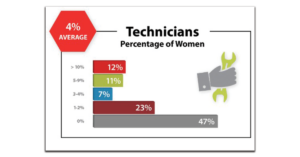
Keelie Boyer, Truck Maintenance & Truck Prep Technician, Wilson Logistics
Americans heavily rely on the trucking industry to supply virtually all of our daily needs. Medium- and heavy-duty trucks make the world go around and are essential to everyday life. While professional truck drivers oftentimes are the most visible faces of the trucking industry, there is another group that is equally important to the supply chain.
Skilled diesel mechanics and technicians are needed to keep those big rigs rolling — and to solve any technical or mechanical issues when they arise. Professional truck drivers cannot pick-up or deliver freight when their trucks are in the shop or broken down on the side of the road – whether it is caused by a problem with the engine aftertreatment system, an electrical issue, or perhaps a problem with the truck’s brakes. That’s why skilled truck maintenance technicians are critical to the success of the transportation industry.
Female Technicians Wanted (and Needed)
According to the U.S. Bureau of Labor Statistics, overall employment of heavy vehicle and mobile equipment service technicians is projected to grow 4% from 2018 to 2028. As the stock of heavy-duty trucks continues to grow, more service technicians will be needed to maintain them. Unfortunately, there is a severe shortage of technicians. In fact, according to the American Trucking Associations (ATA), the industry will need about 200,000 technicians over the next 10 years just to keep up with current truck maintenance demands. U.S. technical schools are only training about 3,500 diesel technicians each year.
There is a significant shortage of women in this field, according to the WIT Index (2024- 25), which reveals that an average of only 4% of their overall technicians are female. Approximately 47% of respondents say they have no women in technician roles. Only 23% report between 1% and 4% of overall technicians are women. However, compared to past WIT Indexes there is an indication that more women are being trained and hired in technician roles. The 2022 WIT Index showed an average of approximately 3.7% women in these roles, which indicates a modest trend of engaging more women in these roles.
What’s Driving More Women to this Career Path?
More and more women become diesel technicians because they want to own their own destiny. Such a career can be challenging and rewarding because it requires problem-solving skills, technical prowess, and it can become a long-term career path that leads to additional opportunities. For example, skills usually are transferable to other fields, such as a high-level customer service position.
Typically, mechanics earn a healthy wage right off the bat. Recent tech school graduates can earn a competitive hourly wage and gain access to solid benefits with the right company. Technical school students carry much less debt compared to students at a 4-year college. And oftentimes, tuition can be paid for (partially or in whole) by the employer if the student commits to working there. In addition, dealerships and other employers also may provide tool purchase assistance (starting tool sets can cost $6,000).
Companies with diesel shops range from dealerships to for-hire motor carriers, companies with larger private fleets, and asset-based third-party logistics companies.

Keelie Boyer: A Strong Start in Truck Maintenance
Keelie Boyer is a truck maintenance and truck prep technician with Wilson Logistics, an asset-based 3PL providing full truckload, heavy-haul, high-cube, yard management solutions, dedicated and power-only solutions. While attending high school in Springfield, MO: “I realized I wanted to go into mechanics when I was a young kid working on cars and trucks with my dad, and tractors with my grandpa.”
At only 19 years of age, Boyer is one of the youngest in the department. “Wilson Logistics has trained me on a lot of things I never knew about trucking and, in this career you are never done learning,” she continues. “You never know everything you’re going to learn – especially when it comes to changes in electronics in trucks. It’s fun because you’re learning all the time.”
At Wilson Logistics, the role of the truck technician is to “keep all of the trucks operating within DOT compliance and to make our drivers want to drive our trucks, says Boyer. “We help to keep our drivers excited about their jobs from the time they open the door and see that everything is clean, shiny and working perfectly.”
Boyer’s responsibilities include prepping trucks for drivers, completing inspections with attentiveness according to the requirements of the U.S. Department of Transportation, and keeping the tire balancing machine cleaned and stocked. Other responsibilities include keeping the tool room clean and organized.
What advice does Boyer give other women considering a career path in the diesel/truck technician field? “If you are younger and you think this is something you may want to do, take an automotive class in school,” she advises. “Gain basic knowledge of vehicles, but realize you don’t need to understand cars and trucks when you first start out because your shop is going to train you,” she says. “Also be ready to stand up for yourself, be willing to listen and learn, be open to take advice from other guys in the shop, be ready to lift heavy things and work safely.”
What are some activities in the day of a life of a technician? Duties range from mounting and dismounting tires and working on electrical systems to replacing damaged body parts, changing filters, wipers, seat covers, and damaged interior parts such as cabinets, visors, shocks, and dash equipment.
Brianna Glowinski: Maintenance Supervisor Extraordinaire
 Brianna Glowinski grew up in a family of what she describes as “handy people.” As a young girl, Glowinski, her brother and father would tinker on equipment in their garage and around the house, and her uncle and his son own a mechanics shop working on transmissions.
Brianna Glowinski grew up in a family of what she describes as “handy people.” As a young girl, Glowinski, her brother and father would tinker on equipment in their garage and around the house, and her uncle and his son own a mechanics shop working on transmissions.
“I was around others who had a sense of quality and pride people take in their work for repairing engines and vehicles,” she says. Because she struggled in high school academics, a teacher encouraged her to consider a technical career working with her hands – which ultimately led her to a career as an auto technician for Toyota for a few years.
As she continued to consider career options, she learned that there were more career and income opportunities in truck/diesel mechanics so she earned her Associates degrees in Diesel Technology and Agriculture Equipment from the University of North Western Ohio.
“I was so fortunate to have met a number of people who mentored me and shared their technical knowledge and life lessons with me,” says Glowinski. During the pandemic, she became a Diesel Technician with Penske Truck Leasing, and through her talent, hard work, and attention to detail she has risen through the ranks of Maintenance Manager Trainee and currently Maintenance Supervisor.
In this role, she ensures her team of maintenance professionals are conducting repairs safely, properly and efficiently, as well as helping them professionally grow as technicians. “I daily oversee their performance as well as their professional growth, whether it’s technical training, working on soft skills, helping them to engage on committees to branch out their portfolios. So essentially I’m focused on working to fix trucks and build people.”

A version of this article is featured in Edition 3 of 2024 in our official magazine, Redefining The Road. Download it here.
Like this kind of content?
As a member of the Wnbaz, stay on top of emerging trends and business issues impacting transportation and logistics; learn the importance of gender diversity in the workplace and the need for more women drivers; and see best practices in encouraging the employment of women in the trucking industry. Join today! Learn More












